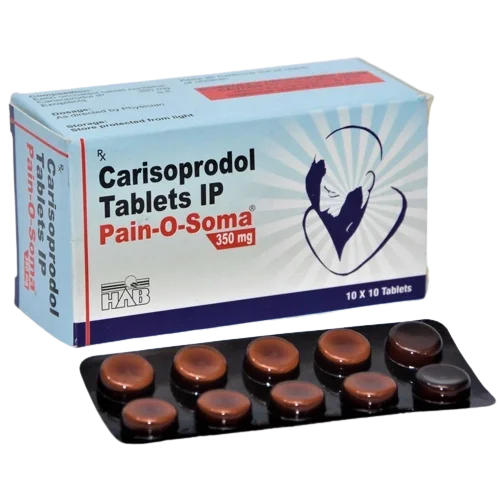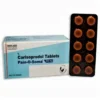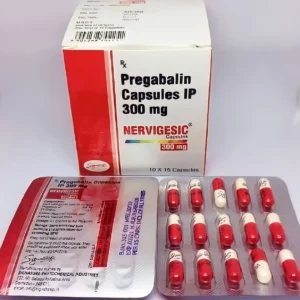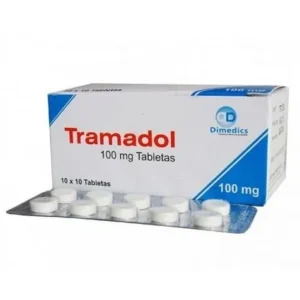Soma 350mg (Carisoprodol): Everything You Need to Know
Soma 350mg, also known by its generic name carisoprodol, is a muscle relaxant often prescribed to relieve pain and discomfort caused by muscle injuries, spasms, or other conditions that affect the muscles. It is commonly prescribed for short-term use to ease acute muscle pain, but like all medications, it comes with important considerations. In this article, we’ll explore what Soma is, how it works, its uses, potential side effects, and everything you need to know before taking it.
What is Soma 350mg (Carisoprodol)?
Soma 350mg is a medication that belongs to the class of drugs called muscle relaxants. The active ingredient in Soma is carisoprodol, which works by blocking pain signals between the nerves and the brain. This medication is typically prescribed for short-term treatment of muscle spasms or injuries. It is designed to provide relief from pain and improve mobility, allowing the muscles to relax and heal. Soma is usually used alongside rest, physical therapy, and other treatments to help reduce muscle discomfort.
How Does Soma 350mg Work?
Soma works by targeting the central nervous system, where it blocks the pain signals sent from the muscles to the brain. This action helps reduce muscle spasms and relieves discomfort. Additionally, Soma has sedative properties, which means it can help promote relaxation, further aiding in the healing process for those suffering from muscle pain. However, because it has sedative effects, it is crucial that Soma be used cautiously to avoid drowsiness, dizziness, or other side effects.
Common Uses of Soma 350mg
Soma is prescribed for the following purposes:
-
Muscle Pain Relief: The most common use of Soma 350mg is to relieve pain caused by muscle injuries like strains, sprains, or other musculoskeletal problems. It helps relax tense muscles and alleviates the associated discomfort.
-
Muscle Spasms: Soma is effective in treating muscle spasms, which are often caused by overuse, injury, or stress. It can help improve mobility by reducing muscle stiffness and pain.
-
Short-Term Use: Soma is recommended primarily for short-term use. Due to its potential for dependency, it is typically prescribed for no more than two to three weeks. Long-term use is discouraged to avoid the risk of abuse or addiction.
How to Take Soma 350mg
Soma 350mg is usually taken orally, in tablet form. The usual starting dosage for Soma is one 350mg tablet, taken three times a day and at bedtime, depending on the doctor’s recommendation. The medication should be taken with a full glass of water. It can be taken with or without food. Always follow your healthcare provider’s instructions regarding dosage and frequency.
Important Dosage Information:
- Do not take more than the prescribed dose.
- Avoid taking Soma for longer than directed by your doctor.
- If you miss a dose, take it as soon as you remember, unless it’s nearly time for your next dose. Do not double the dose to make up for a missed one.
Soma is meant to be used for short-term treatment. Always consult your doctor if the pain persists beyond the prescribed period.
Side Effects of Soma 350mg
Like any medication, Soma can cause side effects. Not everyone will experience them, but it’s important to be aware of the possible reactions.
Common Side Effects:
- Drowsiness: This is the most common side effect of Soma. Due to its sedative properties, it may make you feel sleepy or sluggish.
- Dizziness or Lightheadedness: Some people may experience dizziness, especially when standing up quickly.
- Headache: Headaches are a possible side effect of Soma.
- Nausea or Stomach Upset: Some individuals may feel nauseous or have an upset stomach after taking Soma.
- Blurred Vision: A less common side effect, but it can occur in some individuals.
Serious Side Effects:
- Breathing Issues: Difficulty breathing or shortness of breath can occur, especially if combined with other sedatives or alcohol.
- Irregular Heartbeat or Chest Pain: Any abnormal heart symptoms should be immediately reported to a healthcare provider.
- Unusual Thoughts or Behavior: Some individuals may experience mood changes, confusion, or hallucinations.
- Seizures: Although rare, seizures may occur and require immediate medical attention.
- Allergic Reactions: Severe reactions, such as swelling of the face or throat, may indicate an allergy to the medication.
If you experience any serious side effects, contact your doctor right away. For mild side effects, your doctor can help provide guidance on managing them.
Risks and Precautions
While Soma is effective for treating muscle pain, there are several risks and precautions to consider before starting this medication:
-
Addiction and Dependency: Soma has the potential for misuse and dependency, particularly when used for long periods or in higher-than-prescribed doses. It is important to follow the prescribed dosage and duration of treatment to reduce the risk of addiction.
-
Drug Interactions: Soma can interact with other medications, especially those that affect the central nervous system. Combining Soma with alcohol, other muscle relaxants, or sedative medications can increase the risk of severe side effects, including respiratory depression. Always inform your doctor about any other medications you are taking.
-
Pregnancy and Breastfeeding: Soma is classified as a pregnancy category C drug, which means it should only be used if the benefits outweigh the risks. Carisoprodol may pass into breast milk, so it’s important to discuss with your doctor if you are pregnant or breastfeeding before using this medication.
-
Liver or Kidney Problems: If you have liver or kidney disease, your doctor may need to adjust your dosage or closely monitor your use of Soma to avoid complications.
-
Elderly Patients: Older adults may be more sensitive to the sedative effects of Soma, and therefore, a lower dose may be recommended to minimize the risk of falls and other complications.
Drug Interactions
Soma 350mg can interact with other medications, especially those that affect the central nervous system. Some notable interactions include:
- Benzodiazepines: Using Soma with other sedatives or benzodiazepines (e.g., Valium, Xanax) can cause excessive sedation and breathing issues.
- Opioid Painkillers: Taking Soma with opioids increases the risk of life-threatening respiratory depression.
- Alcohol: Drinking alcohol while taking Soma can lead to extreme drowsiness, dizziness, and difficulty breathing.
Always tell your doctor about all other medications, including over-the-counter drugs and supplements, you are taking to avoid potential interactions.
Stopping Soma 350mg
If you need to stop taking Soma, your doctor will provide instructions on how to gradually reduce your dose. Stopping suddenly can cause withdrawal symptoms, including anxiety, muscle cramps, and headaches. A gradual tapering schedule will help minimize these effects.
Conclusion
Soma 350mg (Carisoprodol) is a muscle relaxant medication that can help relieve muscle pain and discomfort. It works by relaxing the muscles and easing pain, making it an effective treatment for short-term muscle injuries and spasms. However, due to the potential for dependence, it is important to use Soma as directed and for only a short period.
If you experience side effects or have concerns about taking Soma, speak with your healthcare provider. They will ensure the medication is appropriate for your condition and monitor your use to avoid complications. With proper use, Soma can help improve recovery from muscle injuries and allow individuals to resume normal activities more comfortably. Always follow your doctor’s instructions carefully and avoid taking Soma longer than necessary to ensure your safety









 USD $
USD $
 GBP £
GBP £